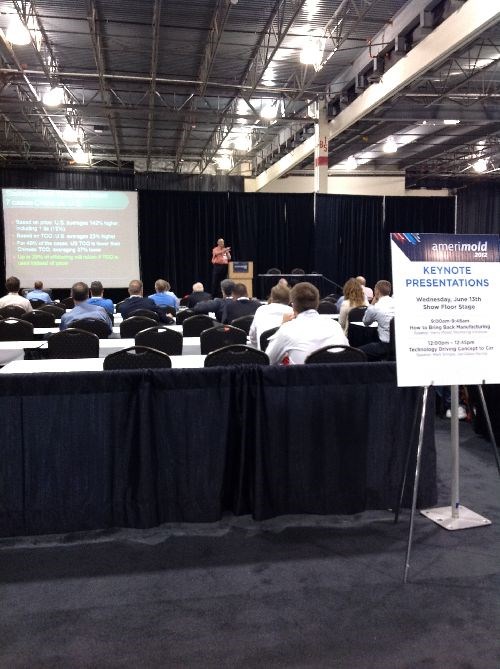Total Cost of Ownership (TCO) Analysis Works for Everything
At the recent amerimold 2012 show in Novi, MI, the opening keynote speaker was Harry Moser. For those of you not familiar with Mr. Moser, he is a retired executive from the machinery industry who now devotes his energies to the Reshoring Initiative. In short, Harry is trying to bring mold and die manufacturing back to the U.S. His argument is based on the concept that when you consider ALL of the costs involved in manufacturing a plastic part (not just the price of the mold), America is more competitive than places like China for many types of parts. Harry has developed a nifty little spreadsheet program that assists mold buyers in calculating the wide range of costs that they will incur when they choose to manufacture a part. This analytical process of identifying and evaluating all of the costs—now and in the future--goes by the name of Total Cost of Ownership (TCO), and moldmakers should also master this process.

At the recent amerimold 2012 show in Novi, MI, the opening keynote speaker was Harry Moser. For those of you not familiar with Mr. Moser, he is a retired executive from the machinery industry who now devotes his energies to the Reshoring Initiative. In short, Harry is trying to bring mold and die manufacturing back to the U.S. His argument is based on the concept that when you consider ALL of the costs involved in manufacturing a plastic part (not just the price of the mold), America is more competitive than places like China for many types of parts.
Harry has developed a nifty little spreadsheet program that assists mold buyers in calculating the wide range of costs that they will incur when they choose to manufacture a part. This analytical process of identifying and evaluating all of the costs—now and in the future--goes by the name of Total Cost of Ownership (TCO), and moldmakers should also master this process. Not just because it will prove extremely useful in their efforts to negotiate and educate mold buyers—trust me, it will. But more importantly, it will also prove extremely useful in their efforts to manage the resources in their shops and in their outside lives.
Economists have long known that there are many costs that somebody, somewhere, at some time will incur in the manufacture, use, and disposal of products that are not accurately reflected in the market price of the good or service. These costs are referred to as external costs. The study of how a market or society deals with external costs over a sustained period of time has been dubbed “deep economics.” I won’t bore you any further with an economics lesson, other than to say that TCO is an important first step in acquiring an understanding of deep economics and I believe that all of us can profit greatly by greater mastery of this subject.
So do yourself a favor and review Harry Moser’s presentation from amerimold 2012. Visit his website and read the articles he has collected. Invite your customers to do the same, and be ready to provide them with concrete examples of how you can save them a lot of money (and also aggravation) by accounting for all of the costs associated with designing, buying, shipping, using, and owning a mold. But don’t stop there. Once you are good at performing TCO analysis, use it to inform your own consumptive decisions as a business person, a citizen, and a head of a household.
In the spirit of full disclosure, I should confess that I consider the study of deep economics to be the most interesting and satisfying aspect of my own chosen profession. I believe that understanding external costs is what separates economists from accountants. And I am convinced that TCO analysis will not only generate greater profits in the long run, it will also generate a much greater amount of non-monetary rewards.
Related Content
-
Treatment and Disposal of Used Metalworking Fluids
With greater emphasis on fluid longevity and fluid recycling, it is important to remember that water-based metalworking fluids are “consumable” and have a finite life.
-
How To Get Your Team on Board with ISO 9001
ISO 9001 can simplify life for the business and the team. Here are 4 ways to sell this certification to gain your team's support.
-
MMT Chats: Marketing’s Impact on Mold Manufacturing
Kelly Kasner, Director of Sales and Marketing for Michiana Global Mold (MGM) talks about the benefits her marketing and advertising, MGM’s China partnership and the next-generation skills gap. This episode is brought to you by ISCAR with New Ideas for Machining Intelligently.















